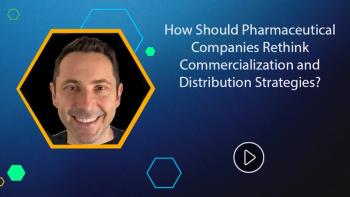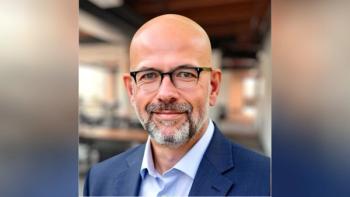
- Pharmaceutical Executive-05-01-2005
- Volume 0
- Issue 0
Eisai's New Leadership
I realized that, as president of a pharmaceutical company, I am now a representative of the entire industry. As such, my toughest challenge is listening to and seeing the kind of scrutiny our industry is taking.
It's strange how sometimes just the right words can change your life. That was the case when, back in 1988, Lonnel Coats, Eisai's US president and chief operating officer, was at home studying for the LSAT, and fighting off a major case of cabin fever. He had just left the fast-paced, go-go world of consumer products at Pepsi-Cola, and was seeking a profession with the same excitement—but with more meaning.
Lonnel Coats grew up through the company's commercial side, and was named Eisai's US president and COO in April 2004.
Coats never did become a lawyer. His studies were disrupted by a friend in the pharma industry who encouraged him to put down the books, and join him at Janssen.
"At first I protested," says Coats. "I said, 'I don't think so—I'm not a doctor, I don't have a medical degree, or medical background.' But he said, 'Listen, Coats, they're not looking for any of that. They're looking for somebody who can think. They'll train you on the rest.'"
Such were the beginnings of a man who, only a year ago, was tapped to head Eisai's almost $2 billion US operation—and today, is probably the highest ranking African-American executive in the pharmaceutical industry.
Coats, along with the newly named chairman and chief executive officer Hajime Shimizu, take over the reigns from William Sheldon, former president and COO, and former chairman Soichi Matsuno, to continue another year of stellar growth.
ON LEADERSHIP
Pharm Exec: What's been the toughest adjustment to being a CEO?
Coats: I realized that, as president of a pharma company, I am now a representative of the entire industry. As such, my toughest challenge is listening to and seeing the kind of scrutiny our industry is taking.
Important Partnerships
How does the scrutiny affect your job?
Public scrutiny and not having a great image can dictate and determine public policy. As an industry head and as the head of this business, if public policy follows the kind of scrutiny we have had here lately, it can indeed stifle innovation.
I think the biggest challenge in the past year, and the one in which I think we'll come into this new year, is how do we begin to resolve the image issues that don't just impact Eisai's presence in the US marketplace, but impact the entire industry.
How do you handle that issue, day in and day out?
The answer is to continue to innovate, as we have historically, and to be able to communicate with the public in a way in which they accept that innovation as value.
We also have to make sure that our people are better prepared for an environment of stronger regulations and more significant law enforcement, public scrutiny, and the overall negative image that the entire industry suffers from. But I think the people who have helped us be successful historically will continue to challenge our organization to be successful in the future.
Hajime Shimizu, chairman and CEO, has worked at Eisai since 1981 and seen it grow from a Japanese company to a global enterprise.
Is it difficult to address industry, as opposed to company, issues?
You know, it is and you're pushed into it. It's not something you seek necessarily. But when policy is made, it is not made as a representation of what one company does in the industry. It is made and it essentially impacts the entire industry. So from a public policy point of view, you're forced to participate and provide some degree of debate and discussion about how to shape the image of the industry to ensure that there is an environment by which your own enterprise can innovate.
Are those efforts mostly funneled through PhRMA?
Some of them are. Having Bill Weldon [J&J's chairman and CEO] as the chairman of PhRMA is a tremendous asset to that organization. The history of Johnson & Johnson is also one of the shining examples of tremendous integrity for any organization or any company. It can only help us begin to make the changes that are necessary to begin to change the image.
Second, we have an opportunity to work with the National Pharmaceutical Council, which uses evidence-based analysis to try to make the case, as we go forward, that there is value in what we do in this industry and that value has to come forward to the public.
Esiai Global Filing Plan
What's it like to be a high ranking African-American in the pharma industry?
First of all, I'm offended—you didn't say that I was a handsome African-American [laughs].
But seriously, I think the number of African-Americans that are succeeding in executive positions continues to grow every year.
There is my good friend, Brad Sheares at Merck, who is president of one of Merck's divisions. There is Myrtle Potter, who is the commercial president at Genentech. Both of those individuals represent a focus on a broad array of companies who continue to make diversity—and diversity of leadership, diversity of ideas, diversity of culture, and diversity of impact—a mandate for the future.
As companies have invested historically in making diversity a top-line priority, people like myself and Brad and Myrtle have become the beneficiaries of that. And I think that you are only going to see more of the diversification of the workforce because of the courage of investments in the past by pharmaceutical executives who saw the need to do so.
ON MEDICARE
From your perspective, what will be the defining events over the next few years?
I never try to be too much of a crystal ball looker. I just look at what the compelling events are in a marketplace that can shape a new industry.
One of the most compelling going forward is the Medicare Modernization Act. That, to me, is a great piece of legislation that will cause every pharma company to think about how they are going to transact business and create value relative to how it has executed in the marketplace. This industry recognizes that the greatest value both to it's future and to patients who rely upon medicines for their care is access. That's why this industry believes so much that the Medicare Modernization Act is not an evolutionary thing. It's a revolutionary thing. It's the best thing that's happened in the area of government programs since 1965.
How so?
The MMA is giving access to 40 million patients who have not had access historically the way they will have access going forward. Those patients are moving into a managed cost system that may not have been there before. And how pharma companies shape themselves and shape the experiences that they are trying to have with the payor market to assure we have access with our innovative medicines will change radically.
How will this change for Eisai?
I believe we will have to innovate even more so as we go forward. It can't just be a tweak of this or a tweak of that and go from twice a day to once a day. It really is going to have to be coming forward with new compounds that radically change the way patients are treated, given that so many patients now will go into a cost containment system that will be paid for by the government.
It can no longer be a third tier or a fourth tier that you're seeking. We have to bring forth products that from an innovative point of view bring overall value to Medicare patients in this plan. I think the government will demand it and I think the pharmaceutical companies will rise to the occasion and provide that value.
Do most companies already know how they're going to manage that transition?
Anytime something new happens, you put your brightest and best minds to help try to figure it out. But we also recognize that we're dealing with policy and policy is subject to change. Policy execution sometimes is subject to change relative to the policy intent. To the degree that we believe the policy as we understand it and how it will go forward, most companies will be prepared to move forward.
To the extent that policy will change and the intent will be executed differently, we don't know exactly what that'll look like, but I do know this: Companies like ours will have to remain flexible and fairly agile. As we go from policy adoption to policy execution, we must be prepared to change our organization to be responsive.
What other access issues are you dealing with?
You know, when we look at developing nations, pharma companies contribute so much product, HIV products, for example, in Africa. All over the globe we provide products to make sure there is care. More importantly, we must begin to look inside our own borders to try to figure out where where we can provide value through medicinal support to those who are getting left behind. And we must put all our efforts to ensure that we do not leave people behind in this country that cannot afford our medicines.
We have programs like Rx for New Jersey, where companies like ours have put forth a tremendous amount of resources to ensure that those who may not be able to afford our medicines have access to them.You're going to see more and more of that take place across the nation. Our industry has an obligation to assure that we serve those who cannot serve themselves. We have an obligation to make sure that those who cannot afford them have access to our medicines. And we have an obligation to ensure that if they cannot afford those medicines, that we provide them with the opportunity to obtain them.
ON ARICEPT
The National Institute for Clinical Excellence (NICE) proposal to ban medicines for Alzheimer's disease within the National Health Service must have been a major challenge to handle your first year on the job.
In all honesty, it really wasn't. That's not to sound arrogant in any way. But when you have the kind of data we have and when you've spent the kind of resources that the Eisai/Pfizer organizations have spent to support this brand to be able to show that not only is it effective, but that more important, patients and families are getting value from it, no one study can disprove it.
It's one of those things that disappoints you when it happens, but when you have confidence in a brand because of the work you've done historically, you know at the end of the day, generally speaking, that we will be supported by the medical community, patients, and their families. And at the end of the day, we were. Aricept (donepezil) remains the most prescribed Alzheimer's medication worldwide.
When you heard the NICE announcement, who did you turn to for consultation?
We have an extraordinary medical affairs department that has essentially carried the load along with our partners at Pfizer to do the scientific work to support the value of Aricept. So I turned to them and we scoured the data again to make sure we are correct in what we believe.
More importantly, I turned to our partners at the Alzheimer's Association. I need to know from their point of view, in terms of who they see and who they talk to day in and day out, are they experiencing what NICE would say? And when they tell me that patients and their families who are on Aricept are getting value out of it, I gain great confidence from that.
Lastly, in terms of direction when something like this happens, I look to our employees. They're the ones who are working hard day in and day out to ensure that the message gets out about Aricept. They're the ones that believe so greatly in our mission to give our first thought to the patients and their families. They're also the ones who may be corresponding with great opinion leaders in the marketplace who each day tell us that this is the drug of choice and it is the gold standard.
ON PARTNERSHIPS
Much of Eisai's success has been linked to successful partnering.
The more I'm in partnerships, the more I understand them and the more value I see in them.
When we launched Aricept, we counted on Pfizer for their infrastructure to drive value for the product. They used to manufacture the product. We now manufacture it ourselves. They used to distribute the product. We now distribute it ourselves.
Then Janssen came along as collaborators for Aciphex [rabeprazole]. Once again, we were able to turn to a well-tested market leader to use their infrastructure to bring value in the marketplace to patients and their families.
What lessons did you learn from those early partnerships, and what advice would you give to other executives?
We had an opportunity to learn from the biggest and most well-respected pharmaceutical company, Pfizer. That's allowed us to build the kind of independent capability in our own infrastructure to partner when partnering makes good business sense or to go it alone because we now have built the infrastructure to do so.
More importantly, we learned that the partnership is not about Eisai, nor is it about the other company. It's not Pfizer. It's not J&J anymore. It's not Eisai. It's Aricept. It's Aciphex. It's about the brand and it's about what we share most about the brand, in that it brings value to patients and their families in the marketplace. When we stay focused on that, partnerships thrive.
And everybody who populates this virtual company must believe the same thing. When you have a virtual company, you have to create a charter for your organization in terms of what you want to be and what you want to become. Therefore, as long as we share the same values, the same vision for this virtual pharmaceutical company, which is the brand, quite frankly, we will be very, very successful.
Articles in this issue
almost 21 years ago
Pharm Exec Ad Starsalmost 21 years ago
Elephant or Specialist?almost 21 years ago
Global Report: Iron Fistalmost 21 years ago
Washington Report: The Pendulum Swingsalmost 21 years ago
What Does It Take to be a Global Leader in Trainingalmost 21 years ago
Unleash the Tabletsalmost 21 years ago
Superstar Selectionalmost 21 years ago
TOCalmost 21 years ago
Professional Persuasion:101almost 21 years ago
Out to Lunch?Newsletter
Lead with insight with the Pharmaceutical Executive newsletter, featuring strategic analysis, leadership trends, and market intelligence for biopharma decision-makers.




